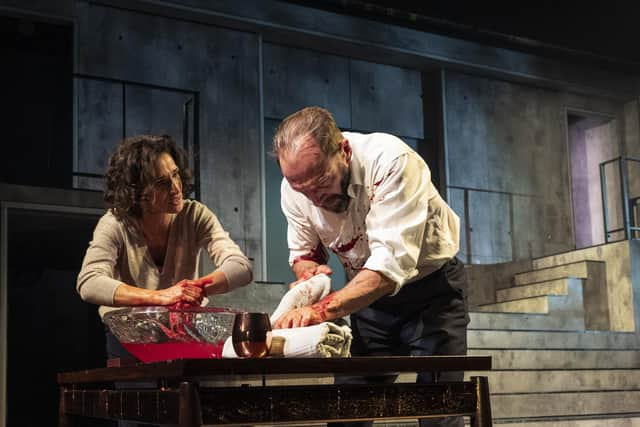Macbeth: Simon Godwin on reimagining the Scottish play with Ralph Fiennes and Indira Varma
You wouldn’t have blamed Simon Godwin for thinking twice about staging Macbeth right now. Just look at the competition. Since the summer, Shakespeare’s Scottish tragedy has been put on by Scotland’s Wils Wilson for the RSC, by Abigail Graham for Shakespeare’s Globe and by Richard Twyman for English Touring Theatre.
Just opened is a staging at London’s Donmar starring David Tennant and Cush Jumbo. And it won’t be long before Edinburgh’s Royal Lyceum revives Zinnie Harris’s Macbeth (An Undoing) for an international tour.
Advertisement
Hide AdFar from being daunted, however, Godwin relishes the variety. “We seemingly have an inexhaustible desire to revisit these texts,” says the director who, having enjoyed a career in Britain, now runs Washington’s Shakespeare Theatre Company.


“The play seems ridiculously different – from a satirical vision of political Britain at the Globe to a Scottish phantasmagoria at the Royal Shakespeare Company to the urban war-torn landscape of ours. I find it interesting to be in dialogue with these other productions and I’d rather be sparked by a colleague’s work than live in terror that it might damage my own thinking.”
He does have a formidable weapon on his side. His Macbeth is Ralph Fiennes who, in addition to his extensive classical stage career, is known as Lord Voldemort in the Harry Potter series and M in Skyfall, Spectre and No Time To Die. Godwin has built the production around Fiennes and Indira Varma as Lady Macbeth. He first worked with the two of them at London’s National Theatre in a production of George Bernard Shaw’s Man And Superman and their ideas have informed the new show.
“The production has been made for those two actors, which makes my life infinitely easier because they are two collaborators,” says Godwin. “Both of them are at a stage when they wanted to think afresh about acting. These plays come so freighted with history and expectation. How do you cope with that? For Indira and Ralph it was to try and see the play as freshly and simply as possible and to discover, in their dynamic, a present tense-ness – a sense we don’t know where the story is going to go.”
Also distinguishing the show is the location. It arrives in Edinburgh on a tour of hangar-like spaces. In Liverpool, it played in a converted warehouse on an industrial estate. Next stops are the former warehouse, Dock X, situated in a London retail park, and a sound stage in Washington DC.
First comes Scotland’s run in the Royal Highland Centre. Here, the audience will be ushered into a dilapidated landscape, suggesting the war Macbeth has just fought and, inevitably, evoking modern-day conflicts. Then we’ll enter the auditorium proper for the main part of the performance.
Advertisement
Hide Ad“The project came from a wish to re-sensitise ourselves to this very familiar play,” says Godwin. “The other aim was to reach audiences we wouldn’t traditionally meet in a commercial West End run. What we found in Liverpool is the quality of listening is quite different from being in plush red seats with your tub of ice cream and your gin and tonic. We’re much more stripped of our defences.”
Without forcing the parallels, he wants this modern-dress Macbeth to reflect our own world – a world in which civilian witches might set in motion the fall of a tyrant. “There is a very delicate balance between evoking a resonance in the audience and co-opting references for the production’s own cause,” he says. “One wants to honour the complexity of the situations we’re facing in the world, but one also doesn’t want to ignore them.”
Advertisement
Hide AdAs well as political movements on a grand scale, Macbeth operates on a domestic level. “The play is about a couple who have murderous fantasies and decide to act on them,” he says. “The play is a study of how a marriage, which is meant of be a cradle of love and support, becomes a cradle of horror, destruction and, ultimately, annihilation. Shakespeare is interested in the domestic roots of violence. The most radically terrible of all of us is still a husband, wife, father, son or daughter. It’s the intimate and the epic. A play that begins with a couple talking about a letter ends in a war between Scotland and England.”
For all its popularity, the play has knotty questions for a director. Should we regard Lady Macbeth misogynistically as the evil power behind the male throne and, if she is that, why does she disappear for so long only to return mentally unbalanced?
“There is a lot of merging of Macbeth and Lady Macbeth,” says Godwin. “Rather than a single figure pushing the other to ever darker acts, it’s about how they become glued together in a shared narrative power. We all recognise that couples can do that. The co-dependency of a relationship can be wonderful and it can also be destructive. When Lady Macbeth comes back sleepwalking, we see it as the moment when she doesn’t know him any more. When her partner becomes a monster who is no longer available to her, she has nowhere to go but her dreams.”
As for his Macbeth, Godwin is in awe of a commitment in Fiennes that goes beyond the expected. “He is a great evangelist for these incredible texts,” he says. “He's technically extraordinary, he’s heartfelt and he’s demanding on – most of all – himself. Perhaps more than any other actor I’ve worked with, he wants the audience to hear the words. He’s really trying not to rush, not to push or pump his way through it but to give the audience access to the poetic dimension of the play.”
Macbeth, Royal Highland Centre, Edinburgh, 12–27 January; Macbeth (An Undoing), Royal Lyceum, Edinburgh, 14–25 May.